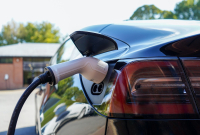Support strong Canadian climate journalism for 2025
Canada’s federal and provincial governments have invested at least $7.6 billion in the past three years in electric vehicle battery plants, creating employment and bolstering the country's position as an EV manufacturer, data from the federal government shows.
The money, from federal and provincial governments, was used to woo 10 EV battery companies to open plants in Ontario and Quebec, close to Canada’s eastern vehicle manufacturing centres, according to statistics from Innovation, Science and Economic Development Canada. Plans for two more plants in Granby and Bécancour, Que., are also underway, but investment information on those two plants is subject to commercial confidentiality and cannot be disclosed at this time, the department said.
Including private sector money, total investment in the 10 plants for which information is available, is $28 billion. Once they are up and running, the plants are expected to generate thousands of jobs in the EV battery production sector and will have the capacity to manufacture batteries for over two million electric vehicles annually, contributing billions to the country's GDP. A 2022 report from Clean Energy Canada estimated that Canada has the potential to build a domestic EV battery supply chain, which could support up to 250,000 direct and indirect jobs by 2030 and add $48 billion to the Canadian economy annually.
Canada’s transportation sector released nearly 180 million metric tons of carbon dioxide into the atmosphere in 2022, accounting for about a quarter of the country’s total. Experts say domestic battery production will help Canada achieve its ambitious target of 100 per cent zero-emission vehicle sales by 2035 and both the federal and provincial governments will play crucial roles in supporting this transition.
“There are several key reasons why domestic EV battery production is essential,” said Sheldon Williamson, a professor at Ontario Tech University in the engineering and applied science faculty.
He cited energy security, economic growth, reduced carbon footprint, innovation and technology development in-house, supply chain resilience, cost reduction and regulatory and incentive alignment as among the most important.
“These investments are a crucial part of the broader strategy to transition towards a more sustainable and environmentally friendly transportation sector,” he added.
Canada’s automotive sector currently employs over 500,000 workers, including nearly 100,000 auto plant workers in Ontario. It contributes $16 billion annually to Canada’s gross domestic product, making it one of the country's largest export industries.
Williamson said the total job creation from investments in the EV auto industry in Canada will vary based on several factors, including the scale of investment, specific projects that are supported, and the growth of the EV market. All of these investments are anticipated to have a positive impact, he added.
The Quebec and Ontario governments are leading the way, investing more than $3.6 billion over the last three years into EV battery production, including the two largest facilities: Northvolt Batteries North America in Saint-Basile-le-Grand and McMasterville, Que., and PowerCo Volkswagen in St. Thomas, Ont.
Two weeks ago, the governments of Canada and Ontario finalized an agreement with Umicore Rechargeable Battery Materials Canada Inc. to establish a new $2.7-billion factory in Loyalist Township, Ont. The Canadian government will contribute up to $551.3 million, with the province providing up to $424.6 million, according to a press release from Innovation, Science and Economic Development Canada.
The project has the potential to manufacture sufficient battery materials to support the production of over 800,000 EVs per year, using critical Canadian minerals such as nickel, lithium and cobalt. This strengthens Canada's and Ontario's domestic EV supply chain and battery ecosystem.
“Canada has everything it needs to be a global leader in the green economy: access to global markets, a talented workforce, clean energy, world-leading innovation ecosystems and all the critical mineral resources necessary to make EV batteries,” said Innovation, Science and Industry Minister François-Philippe Champagne. “This project will bring great economic benefits to Ontario and create well-paying jobs for Canadians, and it is strengthening Canada’s position as the green supplier of choice.”
In the project's initial stage, the company will create 600 new direct jobs. An additional 700 co-op positions for students will be established throughout the project, making Umicore one of the largest private employers in eastern Ontario.
“Umicore’s investment represents another strong vote of confidence in our rapidly growing electric vehicle and battery supply chain,” said Premier Doug Ford. “Together with our government, industry and labour partners, we’re putting our auto sector back on the map, attracting billions of dollars in new investments, creating thousands of new good-paying jobs and ensuring the cars of the future will be made in Ontario, from start to finish.”
Brian Kingston, president and CEO of the Canadian Vehicle Manufacturers’ Association, said Canada has a unique opportunity to significantly enhance its presence in the North American automotive supply chain, including battery production because of its existing manufacturing infrastructure and abundance of critical minerals.
“To effectively win investments, federal and provincial governments need to ensure investment attraction programs are nimble and competitive with the changing global landscape,” said Kingston. "There is an estimated battery supply gap in North America of 544 GWh through to 2030 and to continue to participate in the supply chain of the future, Canada needs the tools to attract additional battery and supply chain investments.”
According to S&P Global Mobility, as of the second quarter of 2023, zero-emission vehicles (ZEVs) constitute one out of every 10 new vehicles registered in Canada. The ZEV market share reached a new high of 10.5 per cent for the second quarter of 2023, up from 9.2 per cent.
S&P Global Mobility reported on its website that battery electric vehicles (BEVs) achieved their highest quarterly registration volume on record in the second quarter of 2023, with nearly 35,000 units registered, representing 7.8 per cent of all new vehicle registrations.
Notably, one in every 10 new vehicles registered in Canada during the quarter was a ZEV, surpassing the previous market share record of 10.3 per cent set in the fourth quarter of 2022.
To achieve its goal of reaching net-zero emissions by 2050, the federal government has mandated that all newly sold light-duty vehicles must be zero-emission vehicles (ZEVs) by 2035.
This story was produced in partnership with Journalists for Human Rights for the Afghan Journalists-in-Residence program funded by the Meta Journalism Project.






Comments
It's one part of the move to achieve net 0.....not the only one, but an essential one none the less. Hopefully, this new industry will come with stringent environmental regulation........and not give into the seductions of neoliberal deregulation and free marketeer none sense...but as an EV owner for the past few years, let me tell you how nice it is to be able to travel without spewing the toxins that come with ICE vehicles.
And yes...EV's alone won't do the trick. But for those who argue public transit is a preferable road forward, let's go for that also, while remembering two things: 1. We live in the third largest country on earth, and not everyone is an urban dweller, and 2. Our cities were made for the automobile; I'll be pushing up daisies before we have the will, the know how and the money to create those dreaded 15 minute cities.
Yes, let's make our cities much less car dependent, while remembering that the difference between a model T and a modern car is almost as great as the difference my kids are going to see between the Kona we drive today......and the EV our grandkids will aspire to own in 2050. There's lots of people who know the fix we're in, and they're working 24-7 to create genuine alternatives that don't require pit mining Mars.
Support them.